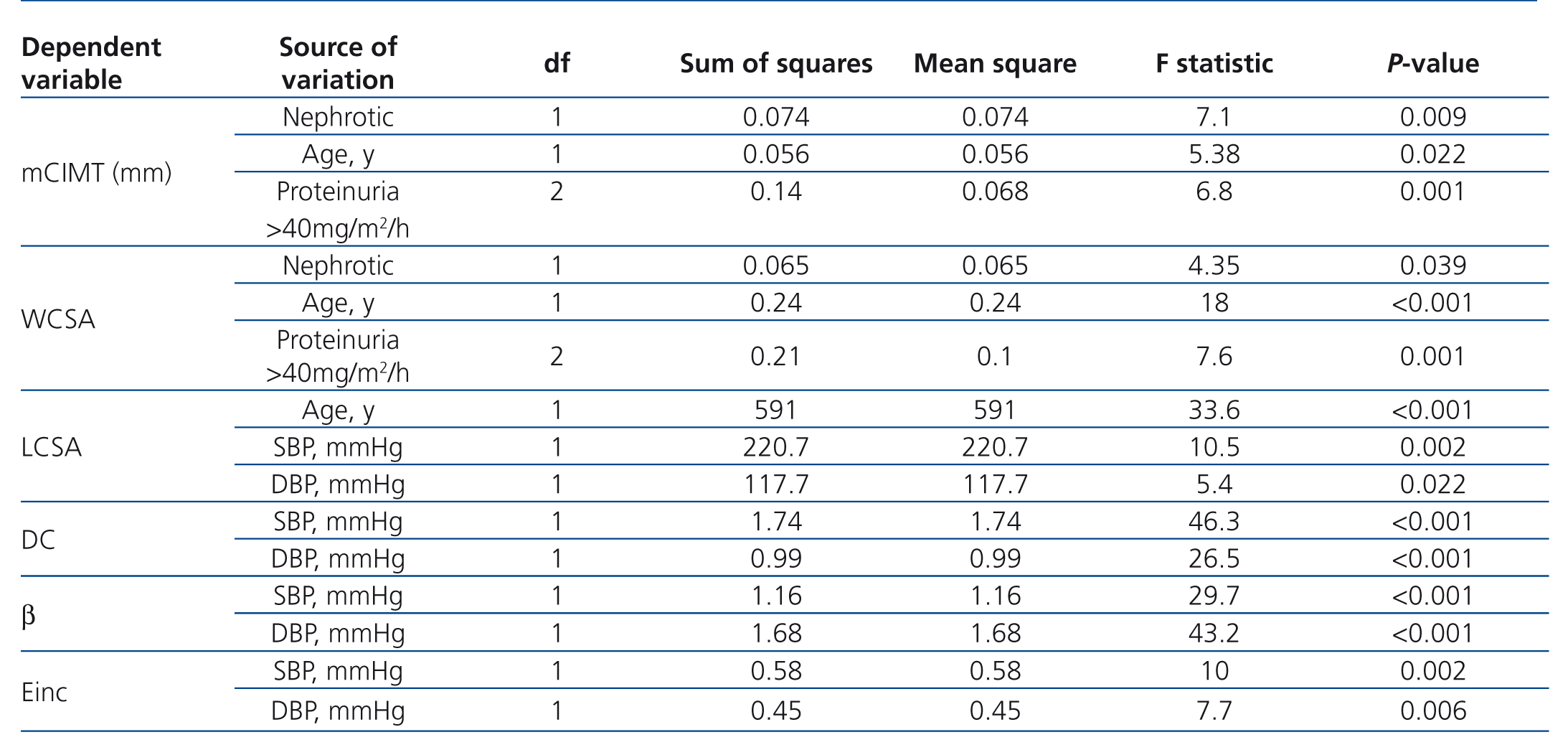Antecedentes: Los pacientes con síndrome nefrótico son propensos a sufrir aterosclerosis como consecuencia de las frecuentes exposiciones a medicamentos para la hiperlipidemia, la hipertensión e inmunodepresores. Objetivos: Hemos estudiado los parámetros de la carótida como indicadores tempranos de aterosclerosis en niños con síndrome nefrótico. Métodos: 51 niños con antecedentes de síndrome nefrótico participaron en el estudio entre 2008 y 2011. Los criterios de inclusión fueron: síndrome nefrótico idiopático con complemento sérico normal, al menos un año después del comienzo de la enfermedad, índice de filtración glomerular superior a 20 ml/min/1,73 m2, mayor de dos años de edad en el momento del estudio. Se tuvo en consideración a setenta y cinco niños del mismo sexo y edad como grupo de control. Se estudiaron los parámetros de la función carótida y el índice de masa ventricular izquierda en niños con síndrome nefrótico. Resultados: Síndrome nefrótico sensible a esteroides, resistente a esteroides y dependiente de esteroides a partes iguales. El grosor íntima-media carotídeo medio (mm) en niños con síndrome nefrótico fue de 0,42 (±0,14), mientras que la TMIR media en controles fue de 0,37 (±0,08) (valor p <0,05). Tras la transformación logarítmica, los análisis multivariables lineales generales revelaron una diferencia significativa de grosor íntima-media carotídeo en pacientes con síndrome nefrótico (valor p <0,001). Posteriormente, el factor que influyó sobre la TMIR fue la duración de la enfermedad (p <0,05). Conclusiones: La mitad de los niños con síndrome nefrótico a los que se les realizó una ecocardiografía presentó hipertrofia ventricular izquierda. Se correlacionó con la rigidez carotídea y la hipertensión sistólica.
Background: Nephrotic patients are prone to atherosclerosis in consequence of frequent exposures to hyperlipidemia, hypertension, and immunosuppressive drugs. Objectives: We studied the carotid parameters as early indicators of atherosclerosis in children with nephrotic syndrome. Methods: Between 2008 and 2011, 51 children with history of nephrotic syndrome enrolled in the study. The inclusion criteria were: idiopathic nephrotic syndrome with normal serum complement, at least one year after initiation of disease, glomerular filtration rate more than 20mL/min/1.73m2, age over two years old at the time of study. Seventy-five healthy sex-age-matched children considered as a control group. Carotid function parameters and left ventricular mass index were studied in nephrotic children. Results: Steroid sensitive, resistant, and dependent nephrotic syndrome included one-third each. The mean carotid intima-media thickness (mm) in nephrotic children was 0.42 (±.14) while the mean cIMT in controls was 0.37 (±.08) (p-value <.05). After log transformation, General Linear Multivariate analysis revealed significant difference of carotid intima-media thickness in nephrotic patients (p-value <.001). Subsequently, the factor that influenced on cIMT was duration of disease (P<.05). One-half of nephrotic children who had echocardiography, showed left ventricular hypertrophy. It was correlated with carotid stiffness and systolic hypertension (P<.05). Conclusions: Carotid intima-media thickness was thicker in nephrotic children. Carotid parameters were influenced by duration of disease and hypertension.








